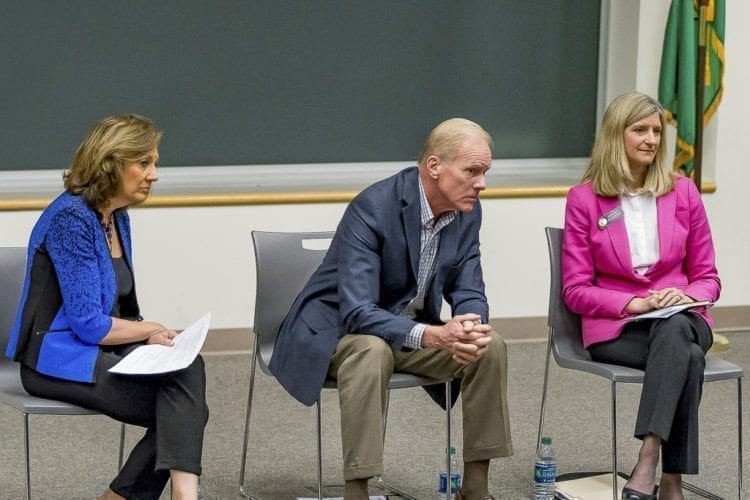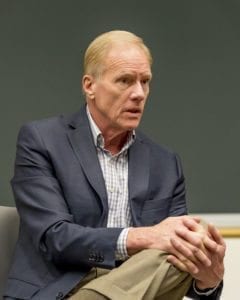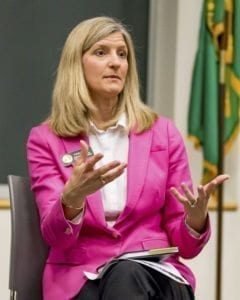Lawmakers also tackled questions on tolling, taxes, and who’s still taking money from the NRA
VANCOUVER — A Legislative Town Hall meeting for Washington’s 17th District legislators largely turned into a debate over school safety and gun control.

Many of the few dozen area residents who showed up at the Dengerink Administration Building auditorium on the WSU Vancouver campus Saturday morning wanted to know what Senator Lynda Wilson, and Representatives Paul Harris and Vicki Kraft, all Republicans, planned to do to keep children safe.
The questions came as hundreds of thousands participated in the March for Our Lives in the wake of the Parkland, Florida school shooting this past Valentine’s Day.

“I think it’s fascinating that the most critical individual in all these school shootings is actually you,” Rep. Harris said to the student who started the conversation about school safety. “The students in every school knew, beforehand, the climate in the school, what was going on. In almost every one of these shootings, at least one of the students knew about it.”
Harris, the ranking minority member on the House Education Committee, said there was funding in the education package to create an app, which would have allowed students to anonymously report threats. The amendment to create that app was ultimately not included in the bill.
“I believe that’s the most important funding that took place in the state,” Harris added, “because I find it odd that the kids are up screaming, and I’ve received tons of emails on it, and my concern was not one of them mentioned that each one of those students could have done something about it. Each one of those students could have said something.”

Sen. Wilson then pointed out that the Parkland shooter, Nikolas Cruz, had been a known potential threat by both the FBI and local police, both of which ignored those reports. That prompted another attendee to mention that it seemed Wilson and Harris were contradicting each other.
“Despite the fact you could have a thousand students saying ‘this guy’s dangerous,’ and neighbors saying the same thing,” she asked, “and nobody acts on those things … I mean, where do you guys see that you have to make the change here?”
Wilson, who is a licensed firearm instructor, responded that there are some things that laws can’t fix.
“You watch things out on the street, and people will just take pictures,” she said. “They don’t get into the middle of something and help someone being beaten to a pulp. It’s so sad what our society has come to. I don’t know how to fix that.”

Rep. Kraft went a step further, pointing to a civics education bill approved during the session, based on a law originally approved in 1994.
“If we really taught this law in our schools, we would not have this problem,” she said, “28A.150.211 is the RCW. Here’s how it reads: ‘Honesty — teach honesty, integrity, and trust. Respect for self and others. Responsibility for personal actions and commitments.’ And it goes on. If we taught that in our homes, in our family — and school would be an extra bonus — we would not have this discussion today in my opinion.” She later clarified that she believes schools, unfortunately, will not add that law into their curriculum.
The lawmakers also responded to a recent newspaper article stating that the 17th District led the state when it comes to receiving campaign donations from the National Rifle Association. Harris said he would not be taking any NRA money during his upcoming re-election bid, but pushed back against claims that money could buy his vote.
“I thought it was a very false article on me,” he said, “because the only reason I’ve taken the most money is I ran two elections before I lost, and the NRA gave to me. I’ve been the longest legislator up here, so I ran the most elections, so of course they’ve contributed to me more. But the idea that the public thinks that you receive a little money from an organization, and then I’m going to lock-step vote with them, tells me that you don’t think that I’m your representative. Shame on you. Shame on you. Because that’s not how it works, at least for me. It never has.”
Harris, who says he has never owned a gun and has no plans to, voted no on the bill banning bump stocks, which was one of the few gun-related bills to ultimately pass this session.
“I wanted to vote yes,” Harris said, “but it was very poorly written. To be quite frank with you what the bill did was, if you moved into our state and you happened to have a bump stock on your gun, and you didn’t know that the law had changed in our state, you would be cited as a felon. I don’t think any of us want that to happen. You confiscate their gun.”
Sen. Wilson corrected Harris, that only the bump stock would be confiscated.
Kraft added that she will continue to accept campaign donations from the NRA, because she supports the second amendment, even though she also does not own a gun.
Kraft also pointed out that House Republicans had tried to get $30 million approved to add more school resource officers, but the amendment was rejected.
“That would have been the easy thing for us to just pass that, and immediately we could have had school resource officers step it up and get more protection,” Kraft said. “The reality is, if you have a person that’s mentally unstable or just a bad intended person, and they get a hold of any weapon, you need someone that can counter that quickly.”
Sen. Wilson also mentioned that she had tried to get a bill through that would have allowed community colleges and technical schools to contract with police for security, and that also didn’t even make it to a hearing.
Value pricing (tolling)
Outside of gun control, the other major issue those in attendance wanted to know about was the possibility of tolling along I-5 and I-205 in Portland. All three 17th District lawmakers said they’re opposed to the idea, and hope Oregon finds another way to address congestion, such as more capacity along I-5, or a third crossing over the Columbia River on Vancouver’s west side.
“Value pricing is happening up in the Seattle area, and they have had nothing but problems,” said Sen. Wilson. “It gets up to ten dollars to ride in that toll lane. I don’t know any legislator over here that is in agreement with what (Oregon) is doing. But it is Oregon, and we can’t affect their laws.”
Harris agreed, saying as much as he’s opposed to the idea of tolling in Portland, he’s uncomfortable with too much interference in what Oregon decides to do. All three did say they plan to be vocal during the public hearing process, and will pressure the Federal government to think very closely before approving the tolling plan.
Wilson said there is a precedent against one state passing a law that impacts the commerce and industry of another state, so it will be interesting to see what the administration of President Donald Trump decides to do.
Legislative wins and losses
Despite being in the minority in both chambers in Olympia, Republicans did manage to stop seven separate Carbon tax proposals, eight of 10 gun laws, and a Capital Gains tax. That last one did prompt a follow-up question from one citizen who believes a state income tax in Washington might be more fair than a sales tax. To that Rep. Harris responded that increasing revenue is not a concern for Washington at the moment.
“We had $1.3 billion more dollars than last year,” Harris responded. “We do not have a problem with revenue in this state. We have tons of money. We have put $6.3 billion into education in the last three years. We have had the largest increase in revenue this year than in the last 15 years. Fourteen percent more money. How many of us had fourteen percent more money in the last year?”
Kraft, who is in her first term as a state legislator, introduced a dozen bills this session, and wasn’t able to get any of them passed. She told ClarkCountyToday.com after the meeting that she would probably be more judicious about what kinds of legislation she tries to introduce next session. But, she also pointed out that this shorter 60-day session saw nearly as many bills introduced and passed as a full-length session, making it more difficult to get ideas noticed.
Education funding
This past session was most notable for the increase in education funding. Harris said he’s eager to hopefully have the Supreme Court’s mandate off their backs.
“I believe that for the first time as a legislator we will have the Supreme Court out of my life on the McCleary decision, and that we have fully funded basic education in this state,” Harris said. “Hopefully we can move on to another issue that will be of importance to the people of the 17th District.”
The Title 9 committee, which Harris sits on, will meet with the state Supreme Court on April 2, so it remains to be seen if they will agree with the legislature on whether the additional education funding meets their mandate.
Majority rules
The session also left many Republicans with a bitter taste in their mouth due to some methods Democrats used to get bills approved. All three 17th District lawmakers said property taxes were set to decrease next year anyway, so they would have preferred that the $391 million dollars earmarked for one-time relief next year would have gone into the state’s Rainy Day fund. Sen. Wilson called the move by Democrats to fund that property tax relief “unconstitutional.’’
She also brought up Initiative 940 (I-940). It was the sole signature-backed referendum in the session. I-940 would make it easier to prosecute a police officer for use of deadly force by taking away the words ‘’with malice’’ from current law, and asking whether officers met a “good faith” standard before using deadly force. In the 11th hour, a compromise was reached in the form of House Bill 3003, which still removed ‘’with malice,’’ but only asked prosecutors to examine whether a reasonable officer would have deemed deadly force necessary to prevent death or serious physical harm to police or others if placed in the same situation.
Under normal procedures the legislature would have had three options: They could pass I-940 as is, approve a competing bill to send to the voters in November, or do nothing and let I-940 go to the voters. Instead they passed I-940, then immediately passed HB 3003 to amend that law 90 days after it takes effect in 2019.
“That is entirely a run-around, around the initiative process,” Wilson said. “That means that any single initiative that any one of the people writes … can be changed. It isn’t the initiative that the people put. It can be changed … According to our constitution we can not pass an initiative and then change it for two years, unless the legislature votes by two-thirds to change that initiative. Except for this time.”
The passage of I-940 and HB 3003 is currently being challenged in court by Tim Eyman, a well-known citizen activist and political watchdog.
Town Hall manners
With word of shouting matches at town hall meetings across the country, this one was notably polite. Despite a number of people who clearly disagreed with the lawmaker’s views on gun control and taxes, there was no yelling or name-calling.
The 17th District represents around 138,000 people, covering much of east Vancouver, the southern half of Battle Ground, and Ridgefield in the Northwest corner of the district. It’s sandwiched between the highly conservative 18th District to the east and north, and the liberal-leaning 49th District, which encompasses downtown Vancouver, Hazel Dell and Salmon Creek.
“I think it’s a microcosm of America,” says Harris. “I believe my district is, probably maybe slightly Republican.”




